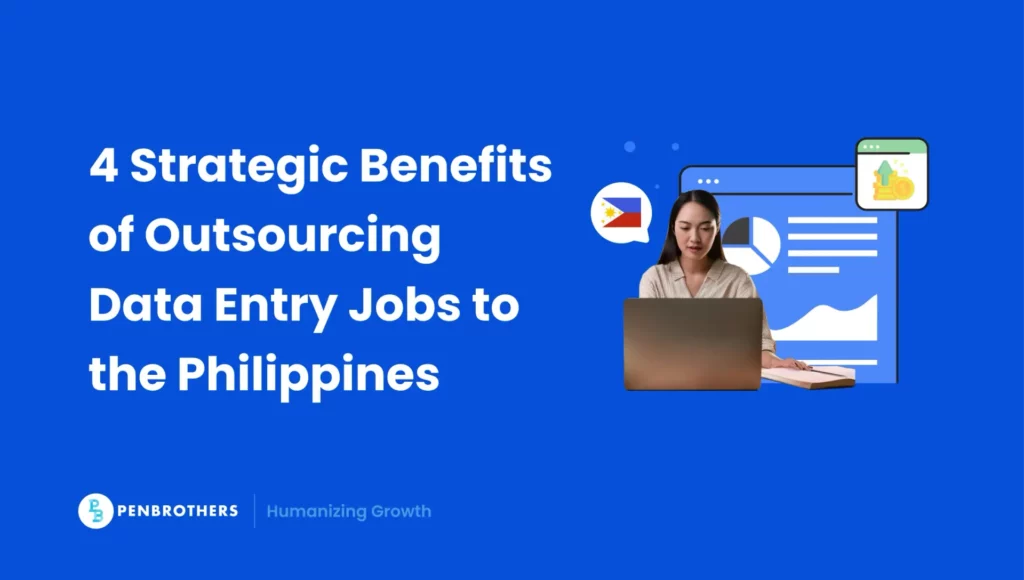Key Takeaways
- Data Entry Done Wrong Becomes a Growth Bottleneck
Errors and delays don’t just waste time. They stall sales and misguide strategy. - Offshoring Is About Speed and Scale, Not Just Savings
Free top talent for high-value work while boosting turnaround and flexibility. - You Can’t Scale Without Process Discipline
Success hinges on quality control and a partner who is obsessed with airtight workflows.
In a market where speed, accuracy, and efficiency decide winners, every misplaced decimal or delayed report costs you money, momentum, and reputation. That’s why more global businesses are pulling data entry out of their already-overloaded teams and partnering with Filipino specialists who can deliver with precision, speed, and care.
Outsourcing data entry to the Philippines isn’t just a “cost-saving move.” Done right, it’s a performance multiplier. Freeing your in-house teams for higher-value work while ensuring your data is clean, secure, and ready to drive decisions.
What is Outsourcing Data Entry?
Outsourcing data entry is the practice of delegating repetitive, accuracy-dependent tasks, such as encoding, cleansing, validating, and formatting data to a third-party provider. In the Philippines, this typically means working with trained professionals who combine technical proficiency with cultural traits that global teams value: attention to detail, reliability, and adaptability.
The benefit isn’t just in the task itself. It’s in what you reclaim: time for strategy, faster reporting cycles, and the mental bandwidth to innovate instead of firefighting.
1. Skilled People, High-Quality Work That Holds Up Under Pressure
Filipino data entry specialists consistently deliver work that meets and often exceeds global accuracy benchmarks. Most have solid educational backgrounds, high English proficiency, and an ingrained commitment to detail. They’re adept in industry-standard tools, but more importantly, they know why accuracy matters in your business.
It’s this context-driven approach paired with proven training. That means fewer costly errors, less rework, and cleaner datasets that hold up to audit scrutiny.
2. Cost Advantage That Actually Improves Quality
The conversation about outsourcing to the Philippines often stops at “it’s cheaper.” The real story: it’s more cost-efficient and quality-sustainable.
Here’s how monthly salaries compare between the Philippines and the US for key data roles:
| Role | PH Monthly Salary (USD) | US Monthly Salary (USD) |
| Data Entry Associate | $600 – $700 | $4,500 – $5,500 |
| Data Engineer | $1,664 – $3,272 | $8,572 – $9,797 |
| Analyst | $1,776 – $2,504 | $6,695 – $8,001 |
| Administrative Assistant | $1,127 – $1,664 | $4,898 – $5,878 |
Savings: Up to 87% per role without cutting corners on skill or output. Those savings can be redeployed to marketing, product development, or tech upgrades instead of ballooning overhead. You can also check out the 2025 Philippine Salary Guide just in case you’re looking for other roles to fill.
Can I Outsource My Data Entry Job?
Absolutely. And you should if:
- Your team spends more time correcting errors than analyzing data
- Reporting delays are slowing decision-making
- You’re burning budget on full-time hires for fluctuating workloads
A consultative outsourcing partner won’t just take the task. They’ll assess your workflows, identify bottlenecks, and tailor a team that scales with you. That means you’re not just getting “people,” you’re getting process improvement baked in.
3. Operational Impact Beyond Cost Savings
Outsourcing data entry correctly does more than offload tasks. It upgrades how your entire operation runs.
- Faster onboarding: Filipino specialists ramp up quickly thanks to prior BPO and multinational exposure.
- Scalability without chaos: Easily add or reduce capacity based on seasonal or project-based demand.
- Reduced turnover drag: Partners absorb hiring, training, and retention costs, keeping your workflow uninterrupted.
The result: your in-house team is free to focus on client-facing, revenue-driving work, while your outsourced team keeps your data machine running smoothly in the background.
4. Data Security That Earns Client Trust
Every breach or data mishandling incident erodes trust, and trust takes far longer to rebuild than to lose. Filipino providers understand the stakes. Reputable teams follow strict global compliance standards (GDPR, HIPAA, SOC 2) and employ:
- Encrypted communication and file transfers
- Secure workstations and role-based access
- Regular security audits and training
It’s not just about checking compliance boxes. It’s about protecting your reputation.
Your Next Step: Build a Data Team That Works as Hard as You Do
Outsourcing data entry to the Philippines isn’t a “vendor relationship.” It’s a strategic collaboration that, when managed with a hypercare mindset, removes friction from your operations, safeguards your data, and fuels smarter decisions.
Whether you need one data encoder or an entire cross-functional data team, the right partner will design the structure, handle the onboarding, and continually optimize your workflows so you see not just cost savings, but measurable performance gains.






